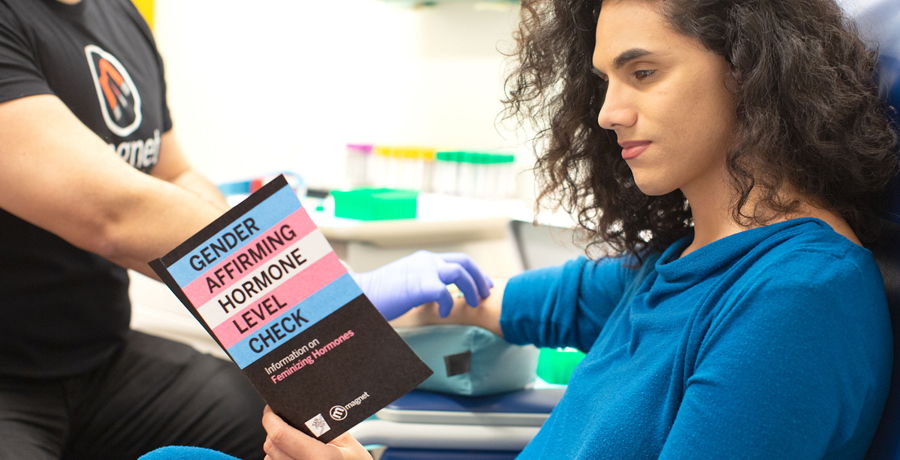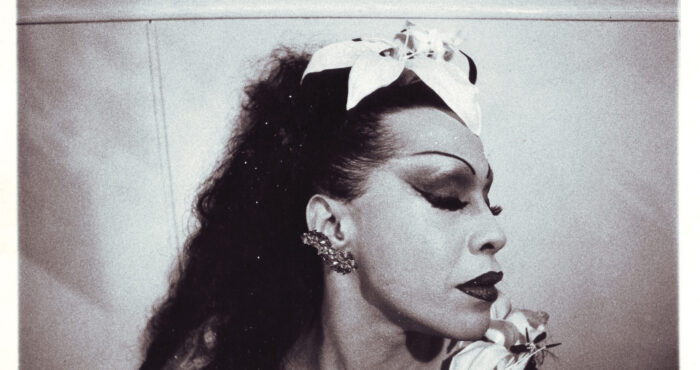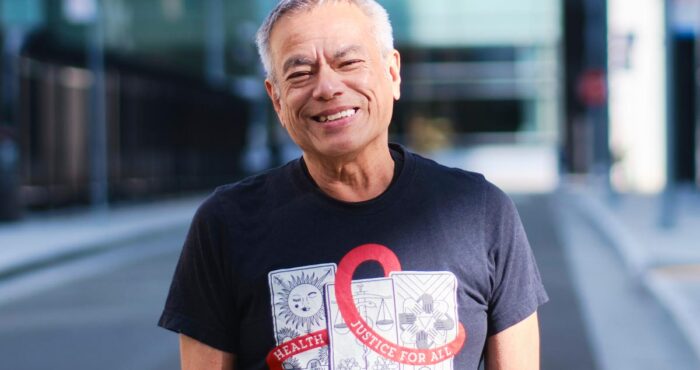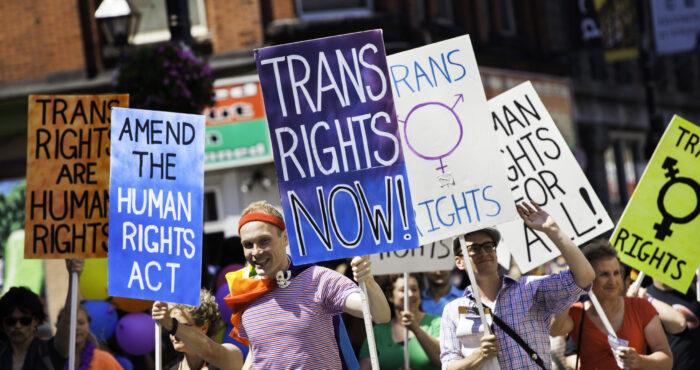Most people associate microdosing with their artist friend who chews on a minuscule amount of mushrooms before painting or the Silicon Valley tech-bro who lists their LSD-laced coffee as the key to their success. Method aside, people say that enhancing their days with a sprinkling of psychedelics lets them be themselves, just better.
Non-binary and transgender people have also adopted microdosing in pursuit of their most authentic selves. Their drug of choice: hormones.
For decades, transgender people have used gender-affirming hormone therapy (GAHT) to alleviate their gender dysphoria. The most common usage has been for transgender people of binary identity who want to transition from masculine to feminine (MTF) or feminine to masculine (FTM). Up until recently, the health care system rooted in Western binary thinking only supported medical transition from one gender to the opposite, A to B.
However, as the gender binary gets broken down with each successive generation, the need to include non-binary and genderqueer people in health care is critical. 56% of Gen-Z reports knowing someone who uses gender-neutral pronouns; that number drops to 43% for millennials. In the most recent and largest survey of transgender people in the United States, thirty-five percent said they identified as non-binary.
In more visual terms, there are as many people who disregard the gender binary as the entire population of Miami (about half a million people). And this doesn’t include the transgender people who weren’t included in the survey because of reasons like homelessness or citizenship status.
Microdosing hormones, also called low-dose GAHT, allows many non-binary-identifying people to achieve more subtle characteristics. Taking estrogen for gender feminization will increase breast growth, reduce body and facial hair growth, and soften the skin. Taking testosterone will emphasize gender masculinization in the form of increased muscle mass, deepening of the voice, and facial and body hair growth.
This slow-and-low approach is what drew 22-year old Reddit user, subspacehipster, to start low-dose testosterone GAHT.
They started researching hormone replacement therapy in middle school and familiarized themselves with the expected changes. But the idea of any sort of change scared them.
“I liked the appeal of starting more slowly so that I could better adjust to the changes,” they said. They also knew that they wouldn’t be on hormones forever, making the microdosing option all the more appealing.
Low-dose GAHT itself is not a new phenomenon. Many binary transgender people who begin their transition will start with lower doses of hormones and slowly build up to a full-dose amount that maximizes the development of secondary sex characteristics.
The doctor that subspacehipster saw knew about this type of binary transition. What she didn’t quite understand was non-binary folks transitioning.
“It was just clear that she didn’t get it,” subspacehipster said. She had worked with several binary transgender people whom subspacehipter knew. They were one of the doctor’s first non-binary trans patients.
She wasn’t able to get past equating non-binary to androgynous, which was not the explanation that subspacehipster used, but it was “close enough I didn’t correct her.”
Despite the gap in understanding, they still see the doctor because she respects the dosage that subspacehipster has chosen and hasn’t tried to change it.
It’s rare to find doctors that will support low-dose GAHT because hormone therapy in itself is built to be an all-or-nothing practice in the U.S. healthcare system. Even for providers offering gender-affirming care, the standard set out by the World Professional Association for Transgender Health (WPATH) is based on binary folks interested in fully transitioning.
But that didn’t fit the path that Reddit user Sarah Valentine wanted in their gender-affirming journey. They began considering GAHT as a way to feel more comfortable in their body and thought that low-dose would be a good place to start.
“I quickly found that the health care system in the U.S. was not amenable to that kind of experimentation, with most prescribers unwilling to follow an informed consent model,” they said.
In the U.S., those looking to start hormone replacement therapy must often obtain a letter from a licensed mental health therapist affirming the patient has gender dysphoria. In other words, that they really are transgender. With an informed consent model, the letter is not needed and the individual can seek out gender-affirming care on their terms. New transgender healthcare startups FOLX Health and Plume emphasize this way of putting the power back into the patient’s hands. San Francisco AIDS Foundation providers with the TransCare program also prescribe hormones based on an individual’s own goals.
Finding a non-binary-affirming therapist alone was a challenge for Valentine. After numerous phone calls, they finally found the person that would write the letter.
The therapist knew how frustrating this type of medical gatekeeping was and just asked one question of Valentine, “Are you transgender?”
“Yes,” they said and the letter of support was signed, sealed, and delivered to the doctor.
In the meeting with their physician, Valentine explained that they were not a binary trans person and not interested in transitioning. Instead, they wanted to be somewhere in the middle.
“I’m more interested in the psychological changes that GAHT can provide versus the physical effects,” they mentioned.
The mental benefits of GAHT are not as discussed as the physical, given the adjacency of this treatment to gender-affirming surgeries. However, for many non-cisgender folks, hormones can relieve the inner anxiety, depression, and frustrations that constitute gender dysphoria.
The dosage for estrogen and anti-androgens that Valentine started on were low enough where there wouldn’t be much significant anatomical change. But mentally, they felt a clear difference.
“The process of thinking my thoughts felt different. I would still have the same thoughts, but the way they would form and move through my consciousness was different,” they said.
Similarly, for emotions, they found themselves experiencing a feeling more often than before. The emotions were also more ephemeral and vivid at the same time, they said. “They had more immediacy to them like they were closer to me than they were before.”
They liken taking hormones to having that first cup of coffee or tea in the morning or putting premium gasoline in their car after having run on the cheap stuff before.
“It feels right, like this is the hormone level I was always designed to run on,” said Valentine.
There’s also a feeling of empowerment that comes with making a decision to take a step in affirming your own gender. There’s risk involved and some of the changes are irreversible, but taking control of your narrative is one of the most powerful actions to support your own identity.
Ultimately, microdose/low-dose GAHT is unique to each individual and the developments they seek in their gender affirmation. One thing to note: Just because the dosage is low doesn’t mean that certain effects won’t happen.
“Low-dose T isn’t some androgynous, less manly version of T,” said subspacehipster.
Transitioning or exploring the gender binary looks different for everyone. Hormones can be part of this journey, but they shouldn’t dictate how “manly” or “womanly” a person is. Now, with increased accessibility to hormones and more transgender and non-binary-affirming providers, trying out GAHT is easier than ever.

Interested in microdosing gender-affirming hormones?
We prescribe gender-affirming hormones based on your individual goals. If you’re interested in exploring microdosing or other gender-affirming hormone dosing, contact us! Call 415-437-3456.










